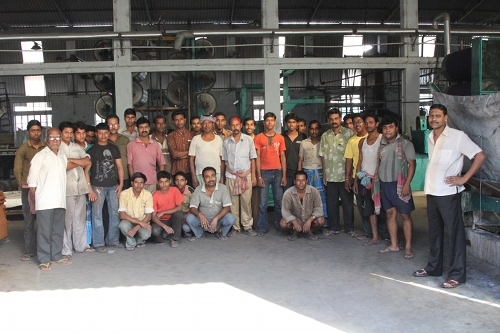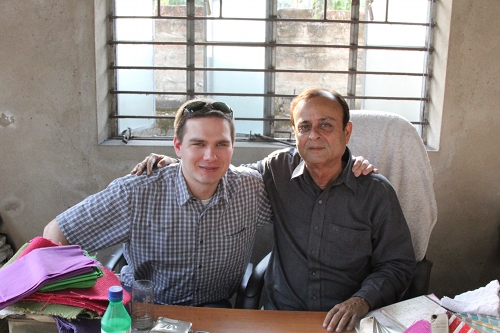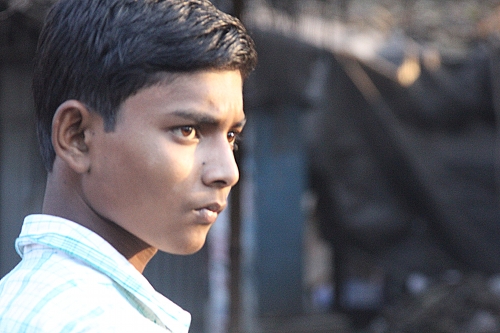Ashok (pronounced a-shook) goes to bed at midnight every day. He gets up at 4am and takes a one-hour train ride during which he sleeps a little more. Then he takes a one-hour bus ride to the five-star hotel in Kolkata where he works in housekeeping. He works 9 hours a day, 6 days a week. On the day I talked with him we was working a double shift to help cover on the strike day, for no extra pay. “It’s no problem.” he says “They are very short-handed today.”
The American idea of hotel housekeeping is completely inadequate to describe what Ashok does. He spends the entire day on the 8th floor. Anytime you step off the elevator he is there to greet you with a formal “Good afternoon, Sir.” Anytime you step out of your room he is there to say hello and see if you need anything. He cleans each room twice per day. He noticed I was drinking only bottled water and voila 6 bottles of water are in my room in place of the usual two. As we are talking he steps away to open and reclose a door down the hall. The guest had accidentally left it slightly ajar and thus unlocked. Somehow while talking to me Ashook noted that the lock did not click, from half a floor away. If you stay in your room all day and only step out for 5 minutes to walk downstairs, it will be clean when you return.
He knows the country each guest is visiting from without asking. By listening to guests speak he has learned enough of several languages to converse. His English is broken but completely adequate for he and I to understand each other.
Ashok has worked on the 8th floor of this hotel for 13 years. He has tears in his eyes as he tells me how he remembers when only one room on the 8th floor was finished construction. He was there as each additional room was finished. “The 8th floor is my baby, my mother, my father.” he says. We would say it is the love of his life. He has had other job offers for 25% more than he makes now, but he will not leave. He could use more money, but he loves his 8th floor. His manager is kind to him, appreciates him, and implores him to stay.
After his shift he goes to the kitchen to train under the chef as a volunteer for two hours. He loves cooking and he wants to learn. Then he takes the two hour bus and train commute back to his home-town. He studies for his “qualification”, the equivalent of a high school diploma. The only sadness I saw in him was when he talked about how he is disappointed with himself that he does not have it yet. He is 38 years old. He picks up notes from the school, studies on his own time, and pays fees to take the final exams. High school here requires proficiency in three languages. He has no classroom time, no teacher, no tutor, no peers to help him understand. He has only his ambition, his desire to grow.
On the train station platform some people are waiting for him. Among them are two children, a boy and a girl. “Their mother and father are gone. They call me uncle. They wait for me every day. ‘Uncle is coming, uncle is coming.’ they say to each other.” (I wonder if today they are waiting 9 extra hours since he is working a double shift.) Others are waiting on the platform for Ashok too. He gives them each something. A few rupees, some bread, some candy, all things he has thoughtfully brought for them from the city at his own expense. “I am giving to God.” he says, smiling and pointing upward.
When he gets home, his elderly mother and father are already in bed, but they don’t sleep until they see that he is home safely. They have no social security, Ashok is their sole provider. Once he is home they are asleep within 5 minutes. Ashok makes himself dinner, takes a bath, and repeats this story again tomorrow.
Two days are special in his week. Thursday is his day off. He cleans the family house. He takes care of his garden. He goes to the market to shop for his family. “I have to do all the week’s marketing in only 1 or 2 hours. It is hard.” He has started a small shop near the train station selling coffee and tea. I have no idea when he finds time to work there.
The other special day is Sunday. On Sundays after work he walks to St. Paul’s Church. He sits there in silence for 1 or 2 hours. “This is my rest.” he says. The way he says the word rest is with an exhaling that comes from every fiber of his being and shows he much he cherishes that time.
Ashok is full of service, loyalty, generosity, diligence and ambition. From his income he supports himself, his mother, his father, and his education. And every day he gives something to those orphans and others.
He makes about $5 per day.
He is one of the happiest people I’ve ever met.



